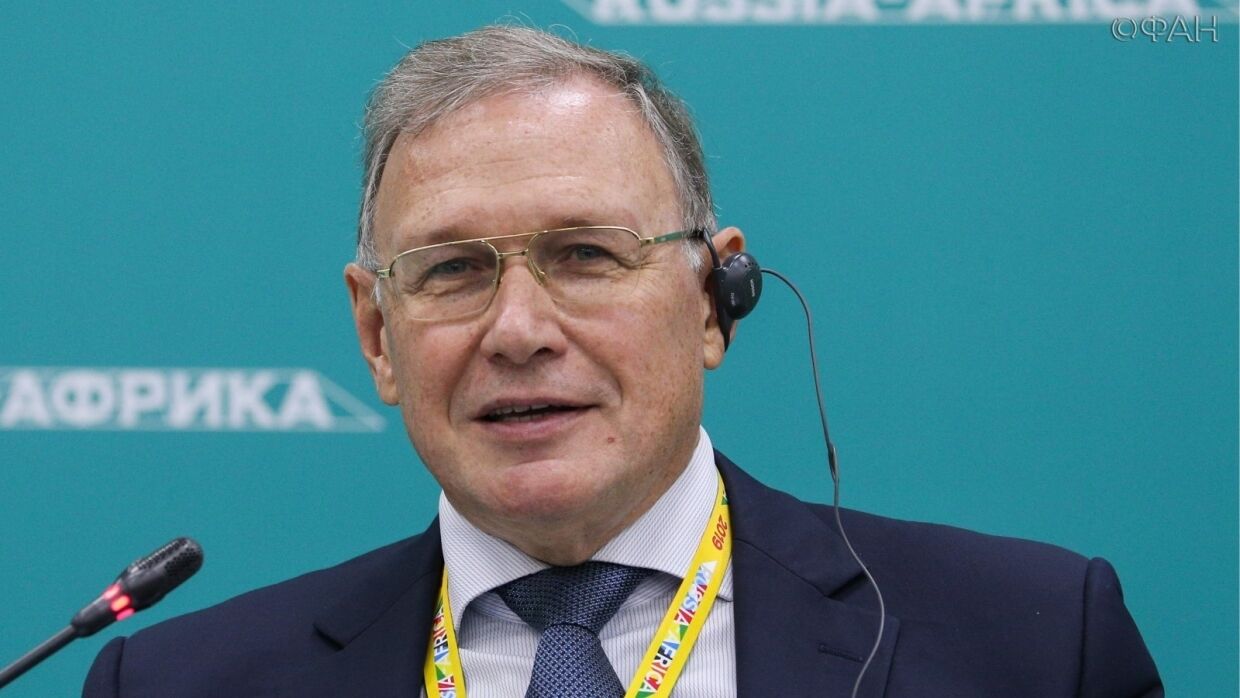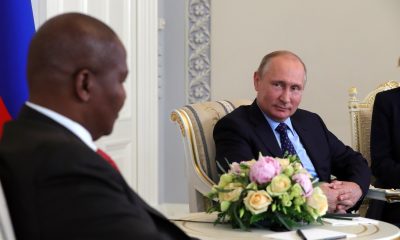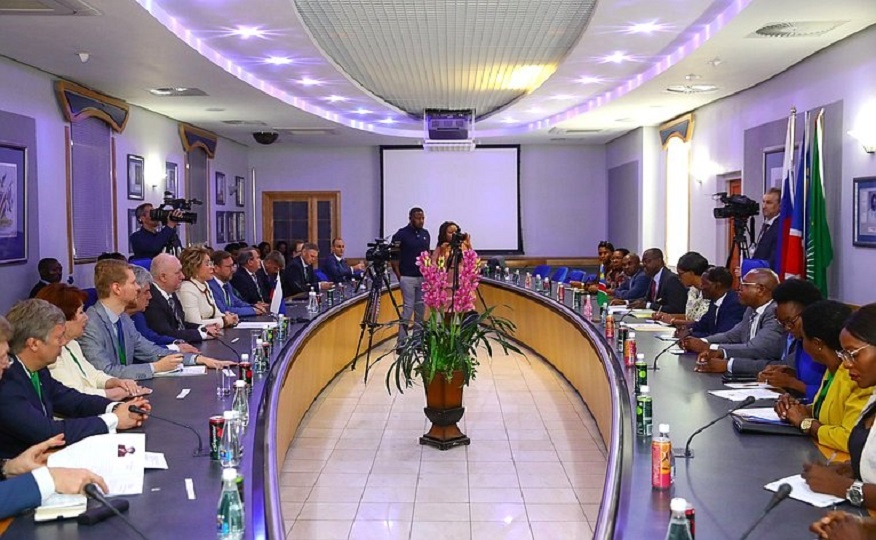World
Ozerov Sees Huge Economic Benefits in Russia-Africa Relations

By Kester Kenn Klomegah
Russia is consistently working on strengthening multifaceted relations with Africa despite the numerous challenges.
After the first Russia-Africa summit held in Sochi, authorities have been moving to build on this new page in the history of Russia’s relations, based on shared values and interests, with African countries.
Within the framework of the joint declaration adopted in Sochi, the Ministry of Foreign Affairs of the Russian Federation created a Secretariat of the Russia-Africa Partnership Forum.
On May 18, the Deputy Director of the Department of Africa at the Russian Foreign Ministry, Mr Oleg Borisovich Ozerov, was appointed Ambassador-at-Large and Head of the Secretariat of the Russia-Africa Partnership Forum.
He is a diplomat with extensive experience at the Foreign Ministry, including with Arab and African countries. In 2010-2017, he was Ambassador to Saudi Arabia and in 2011-2017, Permanent Representative of the Russian Federation to the Organisation of Islamic Cooperation.
In this interview with Kester Kenn Klomegah, Mr Ozerov, Ambassador-at-Large and Head of the Secretariat of the Russia-Africa Partnership Forum, talks about the primary tasks of the Secretariat, current efforts at supporting Russian companies to work in Africa and the way forward with Russia-African relations.
Here are the interview excerpts:
Why it has become important, in the first place, to create the Secretariat of the Russia-Africa Partnership Forum within the Ministry of Foreign Affairs of the Russian Federation?
In October 2019, Sochi hosted the first-ever Russia-Africa Summit, ushering in a new era in the history of Russian-African cooperation. The outcomes of this event are evident in its final declaration. The first few points in the document outline decisions made by the event’s participants concerning the establishment of a Russia-Africa Partnership Forum as the Summit’s supreme body. It also stipulates that annual political consultations will be held between the Foreign Ministers of the Russian Federation and the African States acting as the present, former and future presidents of the African Union.
There needs to be coordinated action between Russian government bodies and economic actors. This is to ensure that the decisions reached at the previous Summit can be implemented, preparations for the next high-level Russian-African meeting made, and diplomatic support provided for communicating with the African Union and government bodies in Africa which oversee foreign policy.
This need for coordinated action has led to the establishment of the Russia-Africa Partnership Forum Secretariat within the Ministry of Foreign Affairs of the Russian Federation. Incidentally, one of its key objectives will be to organise and conduct the aforementioned political consultations. The first round of these consultations was held in July of this year.
The Secretariat has already held a few meetings. Could you please talk about some of the decisions that have been taken with regards to strengthening cooperation with Africa?
I would like to make a small correction. On September 9 this year, Moscow hosted the official presentation of the Russia-Africa Partnership Forum Secretariat and the Association of Economic Cooperation with the African States.
The senior management of the Secretariat’s working bodies were presented at this event. These included the heads of the coordinating council, research council, public council, and the working media group. These people are, respectively, Chairman of the Board and CEO of the Roscongress Foundation Alexander Stuglev, Director of the Institute for African Studies of the Russian Academy of Sciences Irina Abramova, Head of Rossotrudnichestvo Yevgeny Primakov, and Director General of TASS Sergey Mikhailov.
The first meeting of the coordinating council is planned for October this year. The research and public councils should meet accordingly shortly afterwards. Draft resolutions concerning the work of the Secretariat will be discussed at the aforementioned meetings, and the media will be informed of the outcomes in due course.
Is it possible to discuss the roles of the three councils (business, research and public) that were created during the meeting of 9 September?
The decision to set up the councils was taken much earlier, as the concept for the Russia-Africa Partnership Forum Secretariat was being drawn up, which was established, as we know, in June this year. The Secretariat does not have a business council. Issues regarding coordination between federal government bodies and the business sector come under the remit of the coordinating council.
The Association of Economic Cooperation with the African States also performs the role of a business council and operates in close collaboration with the Secretariat.
All three councils are staffed by highly qualified professionals. They include people specializing in international relations, economics and finance, science, business, society and the media, who provide expert support for the Secretariat’s operations.
In your objective view, is there a lot of potential in terms of increasing trade and economic cooperation between the African continent and Russia?
Speaking to the press at the end of the inaugural Russia-Africa Summit, President of the Russian Federation Vladimir Putin noted that in 2018, Russia’s trade with African states exceeded $20 billion. As pointed out by the Head of State, “It is absolutely feasible to reach higher, and bring the value of trade to, at least, $40 billion over the next few years.”
The official figures to come out of the Sochi Summit pay testament to the enormous potential of economic relations between Russia and Africa. Of particular note is the fact that delegations from 54 African nations took part in the event. Of these, 45 were led by Heads of State and Government. The Summit was also attended by the heads of eight regional organizations in Africa, 109 foreign ministers, and two vice presidents.
The Russia-Africa Economic Forum, which took place alongside the Summit, was attended by more than 6,000 participants from 104 countries and territories. These included more than 1,100 foreign business leaders, 1,400 Russian business leaders, and 2,200 members of official delegations from Russia and abroad. Ninety-two agreements, contracts, and memoranda of understanding were signed worth a total of more than RUB 1 trillion.
I would say that when organising and holding the next high-level Russian-African meeting, one of the main objectives will be to further reinforce the powerful momentum built up in Sochi in 2019 in terms of economic collaboration between Russia and African countries. We are now enjoying comprehensive and enduring collaboration which is founded on long-term programmes.
Doing business is not easy in Africa, but what kind of approach do you envisage adopting when it comes to dealing with such issues?
We see our mission as uniting economic operators from Russia and Africa and facilitating the sharing of information between them. We also aim to ensure there is political and diplomatic support for Russian businesses in African countries. The Secretariat will work in close collaboration with the aforementioned Association of Economic Cooperation with the African States.
We enjoy robust ties and have established communications with relevant Russian ministries and government bodies responsible for foreign trade, the Chamber of Commerce and Industry of the Russian Federation, the Russian Union of Industrialists and Entrepreneurs, the Coordinating Committee on Economic Cooperation with Sub-Saharan Africa (AfroCom) and many other organisations.
The task before us is to coordinate the actions of all stakeholders with the aim of effectively promoting Russia’s economic interests in Africa and to foster mutually beneficial cooperation with African nations.
Apart from a corporate business at the state level, Foreign Minister Sergey Lavrov has spoken about developing medium-sized enterprises. Is this part of your plan?
Small and medium-sized enterprises have already been using the AfroCom platform to work together with African countries for a long time. Incidentally, this organisation is planning to soon join the Association of Economic Cooperation with the African States.
Our embassies’ consular departments and trade missions – where they exist – are also providing assistance to small and medium-sized Russian businesses. They are helping them to find partners in African countries and to establish business ties.
In accordance with the decisions made at the inaugural Russia-Africa Summit, we will also help build partnerships for small and medium-sized businesses, and help them to be more active and effective. The plans and strategies, which will be employed to achieve this, will be discussed at the first meeting of the coordinating council this October, as well as at other events.
Looking at current developments and other active foreign players on the African continent, what do you see as the key challenges there?
In terms of intensifying economic collaboration between Russia and African countries, we need to anticipate the technical aspects of having Russian businesspeople, firms, and companies do business on the African continent.
In particular, this means looking at transport accessibility (by air and sea), processes and forms related to mutual settlements, making payments, investment, providing loans, hedging risk, providing legal services and insurance, etc. Work on these aspects must be done immediately, in parallel with work on organising the next Summit.
That said, however, the current coronavirus pandemic is causing considerable difficulties, at the moment. It is affecting international travel and is hindering economic activity across the board, including in African countries.
In terms of competing with other countries on the continent, we are counting on building relations between Russian firms and companies in such a way as to create a sense of camaraderie and solidarity when it comes to withstanding foreign competitors on the African market. This will be another area of focus for the Association of Economic Cooperation with the African States as it works in close collaboration with the Secretariat.
Why do you think Russia’s soft power is not what it was during the days of the Soviet Union?
I cannot say I fully agree with that statement. There are numerous examples of how Russia has achieved notable success through soft power. I would like to particularly draw attention to the fantastic work being done by the Russian news channel, Russia Today, under Margarita Simonyan’s leadership.
And I cannot ignore the fact that in many African countries, a number of important roles within the African Union and a host of other regional organizations are staffed by graduates of Soviet and Russian universities. This says a great deal about the nature of Russian-African partnership. And there is still a high degree of interest among African people in studying in the Russian Federation.
I am also aware that Rossotrudnichestvo (the Federal Agency for the Commonwealth of Independent States, Compatriots Living Abroad and International Humanitarian Cooperation) is working hard to make Russia’s humanitarian presence both more effective and more keenly felt abroad, including in African countries.
What plans do you have in terms of developing cooperation in education, the media and culture over the next few years?
The final declaration of the inaugural Russia-Africa Summit includes an entire section on our collaboration in science, culture, education and social ties.
Rossotrudnichestvo is the main body in Russia responsible for humanitarian cooperation, including with African states. At the next meeting of the public council, we intend to discuss this agenda in detail with Yevgeny Primakov, who heads the organisation. This discussion will take place within the context of implementing the decisions of the Sochi Summit and working towards fulfilling associated objectives.
World
AfBD, AU Renew Call for Visa-Free Travel to Boost African Economic Growth

By Adedapo Adesanya
The African Development Bank (AfDB) and the African Union have renewed their push for visa-free travel to accelerate Africa’s economic transformation.
The call was reinforced at a High-Level Symposium on Advancing a Visa-Free Africa for Economic Prosperity, where African policymakers, business leaders, and development institutions examined the need for visa-free travel across the continent.
The consensus described the free movement of people as essential to unlocking Africa’s economic transformation under the African Continental Free Trade Area (AfCFTA).
The symposium was co-convened by AfDB and the African Union Commission on the margins of the 39th African Union Summit of Heads of State and Government in Addis Ababa.
The participants framed mobility as the missing link in Africa’s integration agenda, arguing that while tariffs are falling under AfCFTA, restrictive visa regimes continue to limit trade in services, investment flows, tourism, and labour mobility.
On his part, Mr Alex Mubiru, Director General for Eastern Africa at the African Development Bank Group, said that visa-free travel, interoperable digital systems, and integrated markets are practical enablers of enterprise, innovation, and regional value chains to translate policy ambitions into economic activity.
“The evidence is clear. The economics support openness. The human story demands it,” he told participants, urging countries to move from incremental reforms to “transformative change.”
Ms Amma A. Twum-Amoah, Commissioner for Health, Humanitarian Affairs and Social Development at the African Union Commission, called for faster implementation of existing continental frameworks.
She described visa openness as a strategic lever for deepening regional markets and enhancing collective responses to economic and humanitarian crises.
Former AU Commission Chairperson, Ms Nkosazana Dlamini-Zuma, reiterated that free movement is central to the African Union’s long-term development blueprint, Agenda 2063.
“If we accept that we are Africans, then we must be able to move freely across our continent,” she said, urging member states to operationalise initiatives such as the African Passport and the Free Movement of Persons Protocol.
Ghana’s Trade and Industry Minister, Mrs Elizabeth Ofosu-Adjare, shared her country’s experience as an early adopter of open visa policies for African travellers, citing increased business travel, tourism, and investor interest as early dividends of greater openness.
The symposium also reviewed findings from the latest Africa Visa Openness Index, which shows that more than half of intra-African travel still requires visas before departure – seen by participants as a significant drag on intra-continental commerce.
Mr Mesfin Bekele, Chief Executive Officer of Ethiopian Airlines, called for full implementation of the Single African Air Transport Market (SAATM), saying aviation connectivity and visa liberalisation must advance together to enable seamless travel.
Regional representatives, including Mr Elias Magosi, Executive Secretary of the Southern Africa Development Community, emphasised the importance of building trust through border management and digital information-sharing systems.
Ms Gabby Otchere Darko, Executive Chairman of the Africa Prosperity Network, urged governments to support the “Make Africa Borderless Now” campaign, while tourism campaigner Ras Mubarak called for more ratifications of the AU Free Movement of Persons protocol.
Participants concluded that achieving a visa-free Africa will require aligning migration policies, digital identity systems, and border infrastructure, alongside sustained political commitment.
World
Nigeria Exploring Economic Potential in South America, Particularly Brazil

By Kestér Kenn Klomegâh
In this interview, Uche Uzoigwe, Secretary-General of NIDOA-Brazil, discusses the economic potential in South America, particularly Brazil, and investment incentives for Brazilian corporate partners for the Federal Republic of Nigeria (FRN). Follow the discussion here:
How would you assess the economic potential in the South American region, particularly Brazil, for the Federal Republic of Nigeria? What investment incentives does Nigeria have for potential corporate partners from Brazil?
As the Secretary of NIDOA Brazil, my response to the questions regarding the economic potentials in South America, particularly Brazil, and investment incentives for Brazilian corporate partners would be as follows:
Brazil, as the largest economy in South America, presents significant opportunities for the Federal Republic of Nigeria. The country’s diverse economy is characterised by key sectors such as agriculture, mining, energy, and technology. Here are some factors to consider:
- Natural Resources: Brazil is rich in natural resources like iron ore, soybeans, and biofuels, which can be beneficial to Nigeria in terms of trade and resource exchange.
- Growing Agricultural Sector: With a well-established agricultural sector, Brazil offers potential collaboration in agri-tech and food security initiatives, which align with Nigeria’s goals for agricultural development.
- Market Size: Brazil boasts a large consumer market with a growing middle class. This represents opportunities for Nigerian businesses looking to export goods and services to new markets.
- Investment in Infrastructure: Brazil has made significant investments in infrastructure, which could create opportunities for Nigerian firms in construction, engineering, and technology sectors.
- Cultural and Economic Ties: There are historical and cultural ties between Nigeria and Brazil, especially considering the African diaspora in Brazil. This can facilitate easier business partnerships and collaborations.
In terms of investment incentives for potential corporate partners from Brazil, Nigeria offers several attractive incentives for Brazilian corporate partners, including:
- Tax Incentives: Various tax holidays and concessions are available under the Nigerian government’s investment promotion laws, particularly in key sectors like agriculture, manufacturing, and technology.
- Repatriation of Profits: Brazil-based companies investing in Nigeria can repatriate profits without restrictions, thus enhancing their financial viability.
- Access to the African Market: Investment in Nigeria allows Brazilian companies to access the broader African market, benefiting from Nigeria’s membership in regional trade agreements such as ECOWAS.
- Free Trade Zones: Nigeria has established free trade zones that offer companies the chance to operate with reduced tariffs and fewer regulatory burdens.
- Support for Innovation: The Nigerian government encourages innovation and technology transfer, making it attractive for Brazilian firms in the tech sector to collaborate, particularly in fintech and agriculture technology.
- Collaborative Ventures: Opportunities exist for joint ventures with local firms, leveraging local knowledge and networks to navigate the business landscape effectively.
In conclusion, fostering a collaborative relationship between Nigeria and Brazil can unlock numerous economic opportunities, leading to mutual growth and development in various sectors. We welcome potential Brazilian investors to explore these opportunities and contribute to our shared economic goals.
In terms of this economic cooperation and trade, what would you say are the current practical achievements, with supporting strategies and systemic engagement from NIDOA?
As the Secretary of NIDOA Brazil, I would highlight the current practical achievements in economic cooperation and trade between Nigeria and Brazil, alongside the supporting strategies and systemic engagement from NIDOA.
Here are some key points:
Current Practical Achievements
- Increased Bilateral Trade: There has been a notable increase in bilateral trade volume between Nigeria and Brazil, particularly in sectors such as agriculture, textiles, and technology. Recent trade agreements and discussions have facilitated smoother trade relations.
- Joint Ventures and Partnerships: Successful joint ventures have been established between Brazilian and Nigerian companies, particularly in agriculture (e.g., collaboration in soybean production and agricultural technology) and energy (renewables, oil, and gas), demonstrating commitment to mutual development.
- Investment in Infrastructure Development: Brazilian construction firms have been involved in key infrastructure projects in Nigeria, contributing to building roads, bridges, and facilities that enhance connectivity and economic activity.
- Cultural and Educational Exchange Programs: Programs facilitating educational exchange and cultural cooperation have led to strengthened ties. Brazilian universities have partnered with Nigerian institutions to promote knowledge transfer in various fields, including science, technology, and arts.
Supporting Strategies
- Strategic Trade Dialogue: NIDOA has initiated regular dialogues between trade ministries of both nations to discuss trade barriers, potential markets, and cooperative opportunities, ensuring both countries are aligned in their economic goals.
- Investment Promotion Initiatives: Targeted initiatives have been established to promote Brazil as an investment destination for Nigerian businesses and vice versa. This includes showcasing success stories at international trade fairs and business forums.
- Capacity Building and Technical Assistance: NIDOA has offered capacity-building programs focused on enhancing Nigeria’s capabilities in agriculture and technology, leveraging Brazil’s expertise and sustainable practices.
- Policy Advocacy: Continuous advocacy for favourable trade policies has been a key focus for NIDOA, working to reduce tariffs and promote economic reforms that facilitate investment and trade flows.
Systemic Engagement
- Public-Private Partnerships (PPPs): Engaging the private sector through PPPs has been essential in mobilising resources for development projects. NIDOA has actively facilitated partnerships that leverage both public and private investments.
- Trade Missions and Business Delegations: Organised trade missions to Brazil for Nigerian businesses and vice versa, allowing for direct engagement with potential partners, fostering trust and opening new channels for trade.
- Monitoring and Evaluation: NIDOA implements a rigorous monitoring and evaluation framework to assess the impact of various initiatives and make necessary adjustments to strategies, ensuring effectiveness in achieving economic cooperation goals.
Through these practical achievements, supporting strategies, and systemic engagement, NIDOA continues to play a pivotal role in enhancing economic cooperation and trade between Nigeria and Brazil. By fostering collaboration and leveraging shared resources, we aim to create a sustainable and mutually beneficial economic environment that promotes growth for both nations.
Do you think the changing geopolitical situation poses a number of challenges to connecting businesses in the region with Nigeria, and how do you overcome them in the activities of NIDOA?
The changing geopolitical situation indeed poses several challenges for connecting businesses in the South American region, particularly Brazil, with Nigeria. These challenges include trade tensions, shifting alliances, currency fluctuations, and varying regulatory environments. Below, I will outline some of the specific challenges and how NIDOA works to overcome them:
Current Challenges
- No Direct Flights: This challenge is obviously explicit. Once direct flights between Brazil and Nigeria become active, and hopefully this year, a much better understanding and engagement will follow suit.
- Trade Restrictions and Tariffs: Increasing trade protectionism in various regions can lead to higher tariffs and trade barriers that hinder the movement of goods between Brazil and Nigeria.
- Currency Volatility: Fluctuations in the value of currencies can complicate trade agreements, pricing strategies, and overall financial planning for businesses operating in both Brazil and Nigeria.
- Different regulatory frameworks and compliance requirements in both countries can create challenges for businesses aiming to navigate these systems efficiently.
- Supply Chain Disruptions: Changes in global supply chains due to geopolitical factors may disrupt established networks, impacting businesses relying on imports and exports between the two nations.
Overcoming Challenges through NIDOA.
NIDOA actively engages in discussions with both the Brazilian and Nigerian governments to advocate for favourable trade policies and agreements that reduce tariffs and improve trade conditions. This year in October, NIDOA BRAZIL holds its TRADE FAIR in São Paulo, Brazil.
What are the popular sentiments among the Nigerians in the South American diaspora? As the Secretary-General of the NIDOA, what are your suggestions relating to assimilation and integration, and of course, future perspectives for the Nigerian diaspora?
As the Secretary-General of NIDOA, I recognise the importance of understanding the sentiments among Nigerians in the South American diaspora, particularly in Brazil.
Many Nigerians in the diaspora take pride in their cultural roots, celebrating their heritage through festivals, music, dance, and culinary traditions. This cultural expression fosters a sense of community and belonging.
While many individuals embrace their new environments, they often face challenges related to cultural differences, language barriers, and social integration, which can lead to feelings of isolation.
Many express optimism about opportunities in education, business, and cultural exchange, viewing their presence in South America as a chance to expand their horizons and contribute to economic activities both locally and back in Nigeria.
Sentiments regarding acceptance vary; while some Nigerians experience warmth and hospitality, others encounter prejudice or discrimination, which can impact their overall experience in the host country. NIDOA BRAZIL has encouraged the formation of community organisations that promote networking, cultural exchange, and social events to foster a sense of belonging and support among Nigerians in the diaspora. There are currently two forums with over a thousand Nigerian members.
Cultural Education and Awareness Programs: NIDOA BRAZIL organises cultural education programs that showcase Nigerian heritage to local communities, promoting mutual understanding and appreciation that can facilitate smoother integration.
Language and Skills Training: NIDOA BRAZIL provides language courses and skills training programs to help Nigerians, especially students in tertiary institutions, adapt to their new environment, enhancing communication and employability within the host country.
Engaging in Entrepreneurship: NIDOA BRAZIL supports the entrepreneurial spirit among Nigerians in the diaspora by facilitating access to resources, mentorship, and networks that can help them start businesses and create economic opportunities.
Through its AMBASSADOR’S CUP COMPETITION, NIDOA Brazil has engaged students of tertiary institutions in Brazil to promote business projects and initiatives that can be implemented in Nigeria.
NIDOA BRAZIL also pushes for increased tourism to Brazil since Brazil is set to become a global tourism leader in 2026, with a projected 10 million international visitors, driven by a post-pandemic rebound, enhanced air connectivity, and targeted marketing strategies.
Brazil’s tourism sector is poised for a remarkable milestone in 2026, as the country expects to welcome over 10 million international visitors—surpassing the previous record of 9.3 million in 2025. This expected surge represents an ambitious leap, nearly doubling the country’s foreign-arrival numbers within just four years, a feat driven by a combination of pent-up global demand, strategic air connectivity improvements, and a highly targeted marketing campaign.
World
African Visual Art is Distinguished by Colour Expression, Dynamic Form—Kalalb

By Kestér Kenn Klomegâh
In this insightful interview, Natali Kalalb, founder of NAtali KAlalb Art Gallery, discusses her practical experiences of handling Africa’s contemporary arts, her professional journey into the creative industry and entrepreneurship, and also strategies of building cultural partnership as a foundation for Russian-African bilateral relations. Here are the interview excerpts:
Given your experience working with Africa, particularly in promoting contemporary art, how would you assess its impact on Russian-African relations?
Interestingly, my professional journey in Africa began with the work “Afroprima.” It depicted a dark-skinned ballerina, combining African dance and the Russian academic ballet tradition. This painting became a symbol of cultural synthesis—not opposition, but dialogue.
Contemporary African art is rapidly strengthening its place in the world. By 2017, the market was growing so rapidly that Sotheby launched its first separate African auction, bringing together 100 lots from 60 artists from 14 foreign countries, including Algeria, Ghana, Mali, Nigeria, Senegal, and others. That same year during the Autumn season, Louis Vuitton Foundation in Paris hosted a major exhibition dedicated to African art. According to Artnet, sales of contemporary African artists reached $40 million by 2021, a 434% increase in just two years. Today, Sotheby holds African auctions twice a year, and in October 2023, they raised $2.8 million.
In Russia, this process manifests itself through cultural dialogue: exhibitions, studios, and educational initiatives create a space of trust and mutual respect, shaping the understanding of contemporary African art at the local level.
Do you think geopolitical changes are affecting your professional work? What prompted you to create an African art studio?
The international context certainly influences cultural processes. However, my decision to work with African themes was not situational. I was drawn to the expressiveness of African visual language—colour, rhythm, and plastic energy. This theme is practically not represented systematically and professionally in the Russian art scene.
The creation of the studio was a step toward establishing a sustainable platform for cultural exchange and artistic dialogue, where the works of African artists are perceived as a full-fledged part of the global cultural process, rather than an exotic one.
To what extent does African art influence Russian perceptions?
Contemporary African art is gradually changing the perception of the continent. While previously viewed superficially or stereotypically, today viewers are confronted with the depth of artistic expression and the intellectual and aesthetic level of contemporary artists.
Portraits are particularly impactful: they allow us to see not just an abstract image of a “continent,” but a concrete personality, character, and inner dignity. Global market growth data and regular auctions create additional trust in African contemporary art and contribute to its perception as a mature and valuable movement.
Does African art reflect lifestyle and fashion? How does it differ from Russian art?
African art, in my opinion, is at its peak in everyday culture—textiles, ornamentation, bodily movement, rhythm. It interacts organically with fashion, music, interior design, and the urban environment. The Russian artistic tradition is historically more academic and philosophical. African visual art is distinguished by greater colour expression and dynamic form. Nevertheless, both cultures are united by a profound symbolic and spiritual component.
What feedback do you receive on social media?
Audience reactions are generally constructive and engaging. Viewers ask questions about cultural codes, symbolism, and the choice of subjects. The digital environment allows for a diversity of opinions, but a conscious interest and a willingness to engage in cultural dialogue are emerging.
What are the key challenges and achievements of recent years?
Key challenges:
- Limited expert base on African contemporary art in Russia;
- Need for systematic educational outreach;
- Overcoming the perception of African art as exclusively decorative or ethnic.
Key achievements:
- Building a sustainable audience;
- Implementing exhibition and studio projects;
- Strengthening professional cultural interaction and trust in African
contemporary art as a serious artistic movement.
What are your future prospects in the context of cultural diplomacy?
Looking forward, I see the development of joint exhibitions, educational programs, and creative residencies. Cultural diplomacy is a long-term process based on respect and professionalism. If an artistic image is capable of uniting different cultural traditions in a single visual space, it becomes a tool for mutual understanding.
-

 Feature/OPED6 years ago
Feature/OPED6 years agoDavos was Different this year
-
Travel/Tourism10 years ago
Lagos Seals Western Lodge Hotel In Ikorodu
-

 Showbiz3 years ago
Showbiz3 years agoEstranged Lover Releases Videos of Empress Njamah Bathing
-

 Banking8 years ago
Banking8 years agoSort Codes of GTBank Branches in Nigeria
-

 Economy3 years ago
Economy3 years agoSubsidy Removal: CNG at N130 Per Litre Cheaper Than Petrol—IPMAN
-

 Banking3 years ago
Banking3 years agoSort Codes of UBA Branches in Nigeria
-

 Banking3 years ago
Banking3 years agoFirst Bank Announces Planned Downtime
-

 Sports3 years ago
Sports3 years agoHighest Paid Nigerian Footballer – How Much Do Nigerian Footballers Earn



















